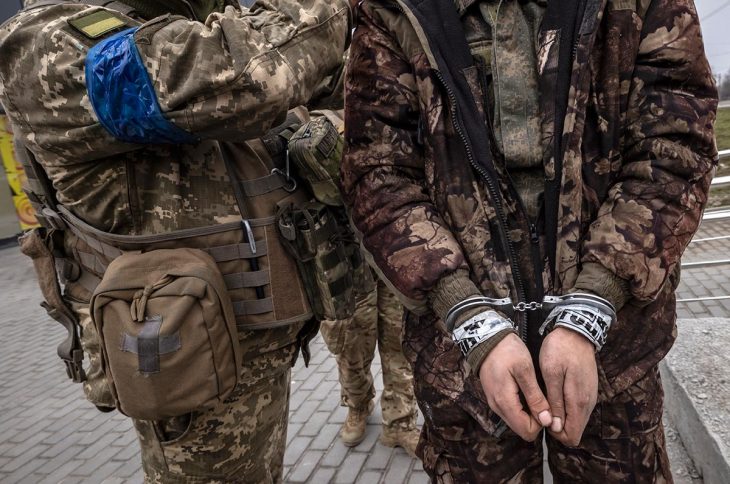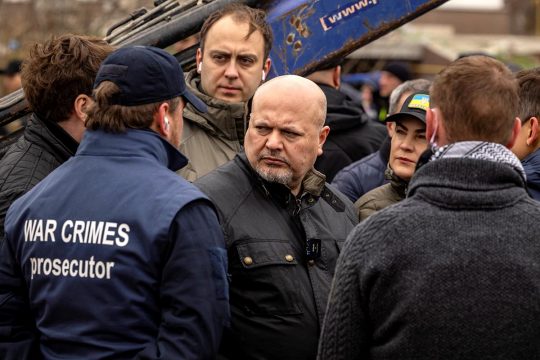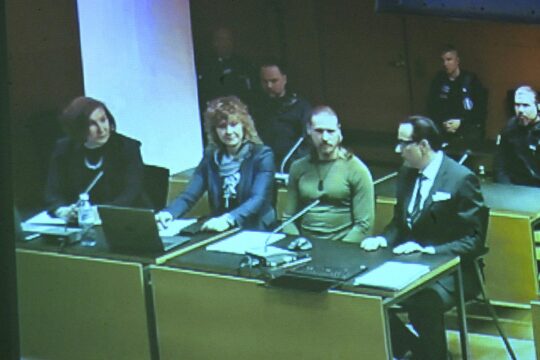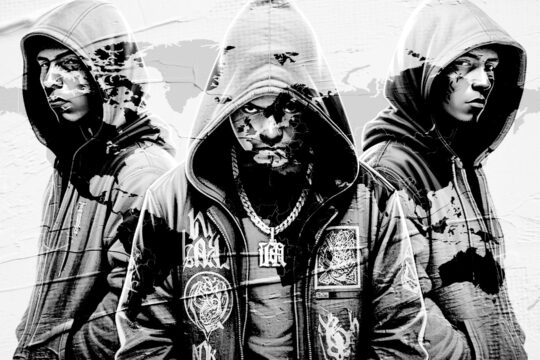“One of the problems we have in particular in this war, is that Russia is the aggressor and that obviously no war crimes or violations of International Humanitarian Law (IHL) would have happened without the Russian aggression. But nevertheless, International Humanitarian Law has the same application to both sides,” says Marco Sassoli, a Professor of International Law at the University of Geneva in Switzerland and one of three independent experts who submitted a report to the Organization for Security and Co-operation in Europe (OSCE).
This OSCE report is the first independent one published on “Violations of International Humanitarian and Human Rights Law, War Crimes and Crimes against Humanity” committed in Ukraine since February 24, when the Russian Federation launched its aggression.
The OSCE mission “found clear patterns of IHL violations by the Russian forces on many of the issues investigated”, says the report. “This concerns in particular their conduct of hostilities,” it continues. “It is not conceivable that so many civilians would have been killed and injured and so many civilian objects, including houses, hospitals, cultural property, schools, multi-story residential buildings, administrative buildings, penitentiary institutions, police stations, water stations and electricity systems would have been damaged or destroyed if Russia had respected its IHL obligations in terms of distinction, proportionality and precautions in conducting hostilities in Ukraine.”
The report says that “some violations and problems were also identified regarding practices of Ukraine”. The mission says it “is in particular concerned about the treatment of prisoners of war, originally considered criminals, and treated in ways that are incompatible with Geneva Convention III [on prisoners of war]”.
Prisoners of War
The report raises serious concerns about treatment of prisoners of war on both the Russian and Ukrainian side. These include lack of transparency on numbers and failure to grant access to the International Committee of the Red Cross (ICRC), which, under International Humanitarian Law defined by the Geneva Conventions, should be the sole body for registering them, informing their families, and visiting them. Both Russia and Ukraine have signed the Geneva Conventions.
The ICRC said on June 3 that “while we have been able to visit some prisoners of war, the parties are yet to give us access to them all. And some is not enough.”
With regard to Ukrainian violations of IHL and possible war crimes, the OSCE report cites in particular the parading of Russian prisoners on social media in the early days of the war, and a video apparently showing Ukrainian forces shooting captured Russian soldiers in the legs, also denounced by Human Rights Watch. Even more serious were subsequent media reports including Al Jazeera’s and the New York Times of captured Russian soldiers apparently being executed by Ukrainian forces.
With regard to the parading of Russian prisoners on social media, Sassoli says that “there were all kinds of pictures on social media and they said we are prisoners, and I'm sorry, and Putin is a criminal and dear mother, please fight against him and all these things, which obviously can put a person into danger and also the family.” Human Rights Watch said that “Ukrainian authorities should stop and prevent posting on social media and messaging apps videos of captured Russian soldiers, in particular those that show them being humiliated or intimidated.”
Sassoli says exposing prisoners of war to “public curiosity” is a violation of IHL, but not a war crime. War crimes fall under IHL, Sassoli explains, but not all violations of IHL are war crimes. For example, keeping prisoners under the auspices of the Prosecutor as if they were all criminals, rather than in military-controlled camps, is a violation of IHL but not a war crime. Even not providing a canteen in a camp is a violation of IHL, for which States could be sanctioned internationally, but not individuals, he says.
However, maiming, torturing or executing captured soldiers would be a war crime if proven and if individual responsibility can be established, he told Justice Info. There is also command responsibility, but that is often even more difficult to prove in a court of law.
Treatment of prisoners of war is governed by the Third Geneva Convention and is effective from the moment of capture. It includes obligations to treat them humanely at all times. Wilfully killing, mistreating or torturing them is a war crime, as is wilfully causing great suffering or injury to health. No torture or other form of coercion may be inflicted on them to obtain information.
Ukraine promises to investigate
“Videos posted online early on March 27, 2022 appear to show Ukrainian forces abusing captured Russian fighters or combatants, who have prisoner of war status, including shooting three of them in the leg,” says Human Rights Watch. The incident appears to have taken place in a village near the city of Kharkiv, which Ukrainian officials had announced retaking two days earlier. A BBC investigation, while not conclusive, found indications that the video could not be dismissed as fake. The BBC quoted Oleksiy Arestovych, an adviser to Ukrainian president Volodymyr Zelensky, as saying there would be an immediate investigation and reminding “all our military, civilians and defence forces that abusing prisoners of war is a war crime".
However, Oleksander Pavlichenko, director of the Ukrainian Helsinki Human Rights Union, told Justice Info from Kyiv that he had received this video, checked it and found it to be “fake”, though he did not specify how he came to this conclusion. He said he had submitted it to the office of the national prosecutor and they came to the same conclusion. He said he had also asked the authorities if there were prisoners of war with corresponding leg wounds, and the answer was no.
But Nadia Volkova, founder and director of the Ukrainian Legal Advisory Group, is sceptical. “They don’t investigate, they never have,” she told Justice Info from western Ukraine where she was forced to flee from Kyiv because of the war. “On this issue, since 2015 [general prosecutors] always pretend that this part does not exist. There are investigations of the Russian side, but not a single one of the Ukrainian side.”
Ukraine has been involved in a war with Russian separatists in the east of the country since 2014 and there have also been allegations of Ukrainian atrocities there. Volkova says former Deputy Prosecutor Gunduz Mamedov was well aware of the issue and that it was politically sensitive. “He knew these investigations needed to be opened and he opened them. But they never reached trial stage”. He resigned from his post in July 2021, citing "deliberately-created difficult working conditions".
The most serious incident, reported by the New York Times on April 6, involves apparent executions of captured Russian soldiers. The newspaper says it verified the video, which “appears to show a group of Ukrainian soldiers killing captured Russian troops outside a village west of Kyiv” on or around March 30. It writes that the video was “filmed on a road just north of the village of Dmytrivka, around seven miles southwest of Bucha, where the discovery of hundreds of corpses of people in civilian clothes has prompted accusations that Russian troops killed civilians as they retreated”. The paper quotes a Ukrainian soldier saying in the video that “these are not even humans”. The BBC also conducted an investigation into this video.
Again Ukraine promised to investigate. But while Ukraine has already held some war crimes trials of captured Russian soldiers, progress remains unclear on probes of its own forces. Pavlichenko told Justice Info he was not aware of that video. He said that any credible allegations of war crimes by Ukrainian forces should also be investigated and prosecuted.
Ukrainian Prosecutor General “should do it”
Sassoli stresses that the OSCE investigation in which he took part only went up to April 1. But, he says, by then Ukrainian Prosecutor General Iryna Venediktova had already opened 4,000 investigations for war crimes. “We specifically asked how many of them are against Ukrainians and we received the answer that there were some cases of Ukrainians who collaborated with the Russian troops but there was not one single case of Ukrainians who were fighting for Ukraine,” he told Justice Info. “This is regrettable, because obviously it would be much easier to prosecute them. In the general atmosphere, not only in Ukraine but also in Switzerland, when you say something about Russian victims you are seen as someone who somehow excuses Putin. We understand that you will not be very popular as Prosecutor in Ukraine if you start to prosecute Ukrainian soldiers. But she should do it.”
He also thinks that Western states should emphasize this. “A lot of Western states are helping the Ukrainian prosecutor in the investigations, including the United Kingdom,” notes Sassoli. “Once I had a meeting over Zoom with their team based in Poland. The Attorney General of the UK was there and everyone was speaking about these horrible Russian war crimes, and I told them perhaps you could also try to explain to the Ukrainian prosecutors that they should also prosecute Ukrainian war crimes. They did not react, but my impression was that they looked at me as if I was trying to defend Putin’s aggression.”








